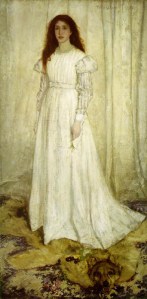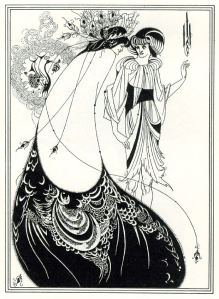Art Teacher A constant beat in the background Increasing in volume, urgency— It courses through her like blood pressure. Constricting against her heart, A bound captive— Holding and pulsing, Yelling, struggling— Go, do! Take nothing and make it SOMETHING! I won’t release My grip Until it’s done Her paint bleeds, Violent splotches A crime scene— And harmonious, Sinuous lines A faint pulse It’s all or nothing. Either this thing is worthy of CREATION Or it’s a naïve attempt at purity That should have been left unborn To teach Was of necessity (Rent, food, car, and all) And when those hazy faces, Restless legs, oversized hands Appeared in her classroom She ducked out at lunch For a smoke And wondered Why they would look to her To tell them What ART IS— Seemed terrible hubris Maybe dangerous too— How to explain it? “The power to create Is universal; But the will to Give birth to the new— That’s different. It’s the glimmer of a cure For an unyielding ache Inside of you.” - Meredith Alexander Kunz, 2020
Category: poetry
Poem: Beginner’s mind
Beginner’s mind comes naturally to me. My mind often Feels spacious, almost blank. It’s like that sensation When you first awake. You’ve forgotten everything You ever knew. I love that moment. Then quickly I deflate When all my cares Start creeping in, Oppressing me once again After I regain consciousness. Here’s the downside, and why it is scary: I fear that I’m too often in a fog. That I may just be losing everything I ever knew. Once upon a time, I was a historian Who knew facts. Dates, people, places… Treaties, leaders, battles, laws… Births, deaths, ascensions to the throne.... It’s mind blowing now To consider how much I knew then, And now don’t. But: Maybe it’s not that at all. Maybe it’s just that I’ve always loved starting From first principles. I have the revolutionary’s bent, To begin fresh and new, Discard old ideas, traditions. I like to go to the heart of a question And then ask more questions, Forge novel connections, Brainstorm unheard-of answers. In any case, I have realized over the years That it is not how much we know. It’s not even (entirely) who we know. It’s not our position or job. It is our connection to one another… It is seeing and recognizing right from wrong… It is raising awareness of each step, each choice… It is working towards courage, wisdom, justice. We can always stop and ask: Is it in harmony with my values? Does it help me to become better, To do the right thing? Every day, every one, a new opportunity. - Meredith Alexander Kunz, 2020
Poem: In His Neighborhood
In His Neighborhood He’d never make an efficiency Out of a human being— Never label, categorize, or Cast disdain on “less than”— Beyond the disposable culture, He saw something that others Overlooked or explained away— Every child an individual Unique creation, to be loved From the start, no fix needed— A patient but firm belief In innate human goodness And, above all, the hidden beauty Of the needy, frightened, Uncertain souls of children— And of the lifelong child within - Meredith Alexander Kunz, © 2020
Poem: I Refuse
I Refuse “Check if your veins Are blue or green,” The makeup ad said. “That will show If you’re cold, warm, Or—if you can’t tell— neutral.” As usual, my body can’t decide. Some days blue. Some green. Some purple-ish. It’s always been that way, Never wanting to pick. To decide is to limit. And so I persist In not selecting. These days, facing The number of my years And graying of my temples Signifies boundaries of time, Paths followed And others left behind. And yet. When I look in the mirror I can’t really decide. Old, young? Filled with promise Or inching closer To the end? Or both? Yes. Both. I refuse to choose. - Meredith Alexander Kunz © 2020
Poem: Song of Winter
We are banished Kings and Queens This season, Shut out and huddled Far from the court of life. Marking one gray day After the next, Stones to hang Around our drooping necks. A time of great shedding, Of unwinding… If we find what’s new And beautiful in spring, Love it fully in summer, Lose it unwittingly in fall— We then mourn it bitterly In winter. Outside our back window: Tree of leaves sucked dry By sun and season, Turned so quickly from Supple lithe green To brittle tan, now denuded. Sign of the times. Build a fire. Warm your hands. Keep your blood pumping And your limbs intact To wait it out— Teeth clenched Knuckles white Lungs burning— For another Spring. - Meredith Alexander Kunz, © 2019
Poem: New Car
New Car
We’ve built a beautiful box
to withstand the storm.
As it whips through
The ink dark sky
We sit inside,
Our seats warm,
Our bodies sound,
Our breathing steady.
And still it howls.
Branches are thrown
Across the street just
Beyond our windshield
And wheels slide atop
Crunchy spiked seed pods,
Thick clusters of fall leaves
Still attached to the wood
Littering the road
In the driving sideways rain.
We careen
Through the gale,
Faster now,
Flying past
Lanes of traffic,
Cars three times
The size of ours
Bearing down
While we whirl
Into the night,
Lights turned on
Extra bright.
In this new car
I am reminded:
It’s been so long that
We have felt this warm,
This comforted,
This insulated -
Sweetly held in this mercy
Of our own devising,
Cradle of metal and glass
Rocked by the wind and rain’s
Fierce lullaby.
- Meredith Alexander Kunz © 2019
Poem: There is so little we actually know
There is so little we actually know We see a face, a smile. Yet deeper—below skin deep— Muscles work, pull and stretch, Contracting to cause a grimace, Relaxing to sigh, synchronizing Speaking, whistling, screaming. And that’s just to make An expression, on the face of it A superficial thing. What about What lies beneath My torso’s taut layer Of epidermis? Larger mystery by far, A complex city of cells— Organs, tissues, blood, and sinew… I’ve heard that some Who meditate long and deep Can feel their organs working: Kidneys filtering, Livers metabolizing, Bladders flushing, Veins filling and flowing, And of course, hearts pumping. I am not so very evolved, yet. And also, I try to recall It’s not all About me, Even though these things Are me: I know each citizen Of this odd metropolis Has its own mind. Each tiny attribute contributes, Yet heeds its own programming— Its own personality, its own destiny. Some rebel against the system. Some profess a disregard For fairness, cooperation. For doing their jobs. And we’ll never even know A subterfuge is underway Until it may well be too late. And for all we say and do, For all we promise and swear, For all we hate and love and judge And laugh and disdain— When it comes to What’s in us, What’s lost, we cannot Bring back again. - Meredith Alexander Kunz © 2019
New Poem: The Artist Asks
The Artist Asks We pause from inboxes And Powerpoints To hear her ask: Who are you? Define yourself Without your jobs, roles, Location, upbringing. Who ARE you? And how do you Make your way In this world? In this giant Etch-a-Sketch Called life No one looks down: We assume a kind of Brownian motion, Never quite able To float above Our own ramblings For long enough To see better. But if we ARE Then shouldn’t there be A kind of flight path, Series of ups, downs, Sideways movements, Our self in action Punctuated by the influence Of extreme externals? A birth, a death. A first date, a fifth. Decades of marriage. A job offer. A home. A lack of a home. A job lost, a job found, A child born, a child Grown up and moved away. Every decision is a revolution In the true sense of the word, A turning, revolving, Head-spinning Change. Each time, Time etches into us— Carves into our bodies Its relentless data— Who you are and Who you’ll become When all the veering around is done. - Meredith Alexander Kunz © 2019
Verse for the season
When the muses smile on me, I write poetry. Here’s a short poem written on an autumn evening here in Northern California:
Night, Fall Moon beams Slice into the sky— From nests of stems and Tangled branches, Half-molded leaves, A wind-swept scraping— Night full of notes, A volume above My mind’s silence After a striving day. Inside, the white noise Of bodies at rest As we settle to sleep— While others out there Awake, subtle shapes Enshadowed, Moving unknown, Unrecorded Into the night. - Meredith Alexander Kunz
The Cult of Beauty
Beauty itself is very subjective, but the pursuit of it is not– either you think things should be beautiful whenever possible, or you don’t really care either way (or maybe believe spending money/time on beautifying things is just a waste). One of the many revolutions of the late 19th century was the notion that everyday objects could and should be beautiful, and that art should infuse even modest homes in ways large and small, from the wallpaper to chairs to teapots.
That way of thinking was a natural response to the mass-produced mayhem of the industrial revolution, and it still influences us today. It’s why we like Apple products–functional AND elegantly beautiful–and why stores as ubiquitous as Ikea feature furnishings that appeal to our sense of style.
That’s just one message lurking beneath the surface at the gorgeous exhibit on view at San Francisco’s Legion of Honor museum right now: The Cult of Beauty: The Victorian Avant-Garde 1860 – 1900. I highly recommend it. Not just for the delectable teapots by Christopher Dresser and wallpaper by William Morris, but also for the many waves of aesthetic movements that it covers, and the many approaches to beauty it encompasses. There are several must-see paintings by James McNeill Whistler, a proponent of “art for art’s sake” who really does show how “modern” artists in this period could be, and a number of over-the-top works by Dante Gabriel Rossetti and company–not my favorite artists but a force to be reckoned with for (at least) a whole generation.
 |
| Symphony in White, No. 1: The White Girl by James McNeill Whistler- This piece is featured in the exhibit. (from Wikipedia Commons) |
Another undercurrent of the show is the rise of sensual approaches to art that scandalized the establishment. Cited in many of the art descriptions is poet Algernon Charles Swinburne. The name brought back a flood of memories for me: I’d written one of my college research papers on some of his poems, comparing his work with that of Gerard Manley Hopkins. These two three-barreled men at first glance had very little in common, one being a “decadent” and sensualist (Swinburne) and the other a devout Jesuit (Hopkins)–but I tried to show how much they did share in a counter-intuitive way. I don’t normally quote myself, but here’s a little taste: “Both poets wrote about the divine and the body, and both believed that there were intimate links between the spiritual and the physical…” And in conclusion: “Both men took uniquely physical approaches to the spiritual, and both attempted to mingle the body and the soul in unique, redemptive philosophies.” Of course the core ideas of those philosophies were at either ends of the spectrum of their age–a Dorian Gray-like release through sensual materialism, vs. a martyr-imbued Catholicism.
 |
| Swinburne, in a contemporary caricature from Vanity Fair (from Wikipedia Commons) |
 |
| Aubrey Beardsley’s The Peacock Skirt (from Wikipedia Commons) |